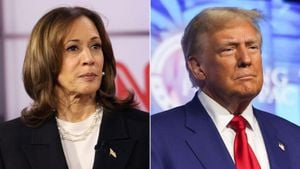Recently, the political arena of Germany has seen significant shifts, particularly with the emergence of new parties and unsettling coalition dynamics. The most notable development is the introduction of the hard-left party, BSW, which is now part of the governing coalition alongside the conservatives and the Social Democrats (SPD) in the eastern state of Thuringia.
According to sources, following the state elections held three months ago, negotiations led by the Christian Democratic Union (CDU), SPD, and the BSW have resulted in the drafting of what they call a 'government contract'. This contract, expected to be revealed soon, reflects what insiders describe as a 'forward-looking consensus' among these parties. With the far-right Alternative for Germany (AfD) party gaining unprecedented ground—winning 32.8% of the vote, making it the first time they have secured victory in a state election—the politics of coalitions have become increasingly complex.
Despite the AfD's significant electoral success, it faces exclusion from power, as all major parties categorically refuse to partner with them. Their stance revolves around contentious issues such as immigration and European Union policies. Responding to this electoral moment, the BSW, led by the outspoken Sahra Wagenknecht—who departed from the far-left Die Linke—secured 15.8% of the votes, landing them comfortably above the SPD, which only garnered 6.1%.
B Wagenknecht's party has emerged focusing its platform on opposing Berlin's military support for Ukraine, as well as opposing the proposed deployment of U.S. missiles on German soil. This contentious stance has proven to be a major hurdle during coalition discussions with the CDU and SPD, both of whom have expressed unwavering support for arms deliveries to Ukraine. According to reports from various German media outlets, the upcoming coalition agreement will similarly include commitments to 'peace initiatives' concerning the Ukraine-Russia conflict.
The political changes are not confined to Thuringia. Other former East German states, like Brandenburg and Saxony, are also engaged in coalition negotiations following the elections. For example, Brandenburg's SPD is currently negotiating with BSW to form its government, after narrowly winning the vote against the AfD. Meanwhile, talks between the CDU, SPD, and BSW have faltered significantly in Saxony, particularly over defense and migration policies, prompting the CDU and SPD to explore the possibility of forming a minority government to stave off another election.
These coalition challenges reflect broader trends influencing Germany's federal political climate as tensions rise. Snap elections are on the horizon, anticipated for February, which adds urgency to these negotiations. Chancellor Olaf Scholz from the SPD has vowed to facilitate this early election after his coalition with the Greens and the FDP fell apart. The breakdown of the traffic-light coalition is largely attributed to long-standing disputes over the country's strict budgetary rules—termed the 'debt brake'—which prevents the government from running budget deficits beyond minimal thresholds, affecting public investment.
Discussions around relaxing this debt brake have escalated recently, garnering broader agreement among German politicians and fiscal experts who argue for increased public investment—especially necessary for infrastructure projects. Yet, the complexity introduced by the electoral system presents potential hurdles for legislative progress. The risk remains real: changes might be stalled if those reforms do not align seamlessly with the upcoming political shifts, as parties jockey for position leading up to the vote.
Germany's political future is not just at stake regionally but is also tied to the larger geopolitical environment, including tensions stemming from its partnerships within NATO and the European Union. The clock is ticking as party leaders deliberate potential coalitions, especially as they each navigate their constituents' increasingly divergent needs and sentiments. Whether internal disputes and external pressures will result in innovative collaborations or lead to stagnation remains to be seen.
Analysts suggest this period of flux within Germany's political sphere is indicative of more significant shifts occurring across Europe, where many citizens have expressed frustrations with traditional political structures. The prevailing sentiment hints at growing calls for transparency and more active engagement between political factions and their constituents, signaling a potential slow move toward more participative governance.
The upcoming months appear to be pivotal for Germany, where discussions among factions will not only revolve around domestic policy but also how they intend to play their part on the global stage. The potential ramifications are immense, with party lines being redrawn and questions looming over who will be leading the charge when the February elections roll around.
It is clear; the political theater is intensifying, and the stakes are high. How these relationships play out will determine much about Germany's political and economic future as it navigates pressures from within and beyond its borders.



